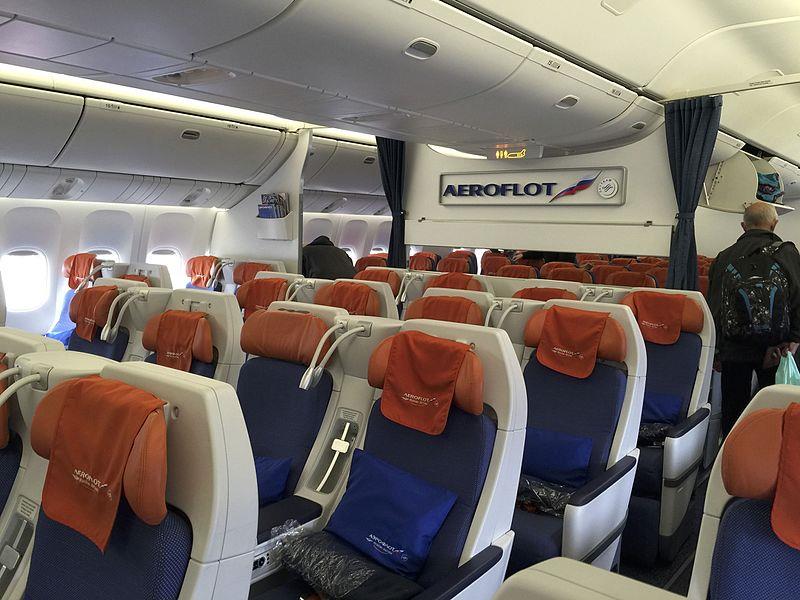Company news in brief
Aeroflot losses widen as traffic slumps
Russian airline Aeroflot on Tuesday reported its first-quarter net loss widened to 22.48 billion roubles (US$326.2 million) after traffic tumbled because of travel curbs imposed in response to the coronavirus pandemic. In March alone, the carrier’s passenger traffic slumped more than a third from a year ago and was down 12.3% for the quarter, according to data Aeroflot published in April. Aeroflot reported its earnings before interest, taxes, depreciation and amortisation (EBITDA) fell by 38.8% to 13.05 billion roubles, while net loss widened by 42.8%. Russia's flag carrier, however, said it expected market recovery to begin "in the near future as the airline industry is preparing for a gradual restart after almost three months of lockdown.” VTB Capital analysts said they expected the group’s EBITDA to fall 41% to 100 billion roubles in 2020, but saw it exceeding the 2019 level as early as in 2021. Globally, the International Air Transport Association does not expect passenger traffic to return to pre-crisis levels until 2023 at the earliest.
NAMPA / REUTERS
European shares up; Lufthansa lifts Germany
European shares inched closer to a three-month high on Tuesday on optimism around a post-coronavirus economic recovery, with German stocks buoyed by a jump for Lufthansa. The pan-European STOXX 600 rose 1% in early deals to hit its highest level since March 9. Lufthansa surged 7.5% as its supervisory board approved a nine-billion-euro (US$10 billion) government bailout for the airline, driving Frankfurt-listed shares up 2.6% to its peak since March 5. With traders in Germany returning from a long weekend, Volkswagen, Daimler and BMW gained between 4.5% and 7.7% on a Reuters report on Sunday that the country's Ministry of Economics had proposed a five-billion-euro buyer bonus scheme to boost car sales. Norway's Seadrill slid 9.3% as it announced a writedown of US$1.2 billion on the value of its oil drilling rigs and warned it may have to convert a part of its US$7.4 billion in debt into equity to survive. Gains across the other markets were tempered by simmering US-China tensions, with Wall Street futures coming under pressure as President Donald Trump vowed to use the military to halt protests over the death of a black man in police custody.
NAMPA / REUTERS
China's Potala Palace to reopen
The Potala Palace in southwest China's Tibet Autonomous Region will reopen to the public on June 3, as the COVID-19 epidemic has waned in the country. Visitors to the Potala Palace in Lhasa, capital of Tibet, must first make online reservations while their number will be strictly controlled, according to an announcement issued Tuesday by the administration of the palace. The 1 300-year-old palace has been shut down since January 27 due to the spread of the novel coronavirus. The Potala Palace is a model of ancient architecture and home to over 100 000 cultural relics. It was built by Tibetan King Songtsa Gambo in the seventh century and expanded in the 17th century by the fifth Dalai Lama. The palace was included on the UNESCO World Heritage List in 1994.
NAMPA / XINHUA
Samsung expands production
Samsung Electronics, the world leader in advanced memory technology, has announced plans to expand its NAND flash production capacity in Pyeongtaek, Korea. Construction, which began this May, will pave the way for mass production of Samsung's cutting-edge V-NAND memory in the second half of 2021. "The new investment reaffirms our commitment to sustain undisputed leadership in memory technologies, even in uncertain times," said Cheol Choi, executive vice-president of Memory Global Sales & Marketing at Samsung Electronics. Samsung's NAND flash production network extends from Hwaseong and Pyeongtaek in Korea to Xi'an, China. Established in 2015, Samsung's Pyeongtaek Campus is a hub for next-generation memory technologies, consisting of two of the world's largest-scale production lines. Leveraging its significant edge in manufacturing and technology, Samsung has held the leadership position in NAND flash memory for the past 18 years, with one recent innovation being the industry-first sixth-generation (1xx-layer) V-NAND introduced last July.
NAMPA / AFP
Beyontec brings digital insurance to Rwanda
Beyontec, provider of insurance technology solutions, has announced its selection by the Insurance Association of Rwanda (ASSAR) to implement a digital ecosystem of different platform solutions for the insurance industry in Rwanda. Founded in 1992, ASSAR has been at the forefront of driving rapid transformation across insurance markets in Rwanda. Beyontec and ASSAR plan platform-centric insurance initiatives such as the end-to-end transformation of motor certification to a fully automated digital motor policy issuance and administration platform. They will also work together to establish a claims recovery platform to manage intra-company claims recovery, a data repository platform, a comprehensive garage registration and management platform, and a finance analytical platform to manage statutory reporting. Gaudens Kanamugire, Chairman of ASSAR said, "the current expectations of insurance customers across the African regions have gone up as influenced by the digital revolution. Today, we need to leverage the abundance of customer data and platform ecosystems to create collaborative business models that will help both insurance players and end customers. We believe that Beyontec is the right partner to help us navigate past challenges like data management, increase in the number of insurance-related non-compliance, and legacy IT system modernisation while empowering us to invest in a workforce of the future". Vivek Sethia, director and co-founder of Beyontec Solutions said, "together we are committed to driving platform-driven insurance transformation in Rwanda.”
NAMPA / AFP
Russian airline Aeroflot on Tuesday reported its first-quarter net loss widened to 22.48 billion roubles (US$326.2 million) after traffic tumbled because of travel curbs imposed in response to the coronavirus pandemic. In March alone, the carrier’s passenger traffic slumped more than a third from a year ago and was down 12.3% for the quarter, according to data Aeroflot published in April. Aeroflot reported its earnings before interest, taxes, depreciation and amortisation (EBITDA) fell by 38.8% to 13.05 billion roubles, while net loss widened by 42.8%. Russia's flag carrier, however, said it expected market recovery to begin "in the near future as the airline industry is preparing for a gradual restart after almost three months of lockdown.” VTB Capital analysts said they expected the group’s EBITDA to fall 41% to 100 billion roubles in 2020, but saw it exceeding the 2019 level as early as in 2021. Globally, the International Air Transport Association does not expect passenger traffic to return to pre-crisis levels until 2023 at the earliest.
NAMPA / REUTERS
European shares up; Lufthansa lifts Germany
European shares inched closer to a three-month high on Tuesday on optimism around a post-coronavirus economic recovery, with German stocks buoyed by a jump for Lufthansa. The pan-European STOXX 600 rose 1% in early deals to hit its highest level since March 9. Lufthansa surged 7.5% as its supervisory board approved a nine-billion-euro (US$10 billion) government bailout for the airline, driving Frankfurt-listed shares up 2.6% to its peak since March 5. With traders in Germany returning from a long weekend, Volkswagen, Daimler and BMW gained between 4.5% and 7.7% on a Reuters report on Sunday that the country's Ministry of Economics had proposed a five-billion-euro buyer bonus scheme to boost car sales. Norway's Seadrill slid 9.3% as it announced a writedown of US$1.2 billion on the value of its oil drilling rigs and warned it may have to convert a part of its US$7.4 billion in debt into equity to survive. Gains across the other markets were tempered by simmering US-China tensions, with Wall Street futures coming under pressure as President Donald Trump vowed to use the military to halt protests over the death of a black man in police custody.
NAMPA / REUTERS
China's Potala Palace to reopen
The Potala Palace in southwest China's Tibet Autonomous Region will reopen to the public on June 3, as the COVID-19 epidemic has waned in the country. Visitors to the Potala Palace in Lhasa, capital of Tibet, must first make online reservations while their number will be strictly controlled, according to an announcement issued Tuesday by the administration of the palace. The 1 300-year-old palace has been shut down since January 27 due to the spread of the novel coronavirus. The Potala Palace is a model of ancient architecture and home to over 100 000 cultural relics. It was built by Tibetan King Songtsa Gambo in the seventh century and expanded in the 17th century by the fifth Dalai Lama. The palace was included on the UNESCO World Heritage List in 1994.
NAMPA / XINHUA
Samsung expands production
Samsung Electronics, the world leader in advanced memory technology, has announced plans to expand its NAND flash production capacity in Pyeongtaek, Korea. Construction, which began this May, will pave the way for mass production of Samsung's cutting-edge V-NAND memory in the second half of 2021. "The new investment reaffirms our commitment to sustain undisputed leadership in memory technologies, even in uncertain times," said Cheol Choi, executive vice-president of Memory Global Sales & Marketing at Samsung Electronics. Samsung's NAND flash production network extends from Hwaseong and Pyeongtaek in Korea to Xi'an, China. Established in 2015, Samsung's Pyeongtaek Campus is a hub for next-generation memory technologies, consisting of two of the world's largest-scale production lines. Leveraging its significant edge in manufacturing and technology, Samsung has held the leadership position in NAND flash memory for the past 18 years, with one recent innovation being the industry-first sixth-generation (1xx-layer) V-NAND introduced last July.
NAMPA / AFP
Beyontec brings digital insurance to Rwanda
Beyontec, provider of insurance technology solutions, has announced its selection by the Insurance Association of Rwanda (ASSAR) to implement a digital ecosystem of different platform solutions for the insurance industry in Rwanda. Founded in 1992, ASSAR has been at the forefront of driving rapid transformation across insurance markets in Rwanda. Beyontec and ASSAR plan platform-centric insurance initiatives such as the end-to-end transformation of motor certification to a fully automated digital motor policy issuance and administration platform. They will also work together to establish a claims recovery platform to manage intra-company claims recovery, a data repository platform, a comprehensive garage registration and management platform, and a finance analytical platform to manage statutory reporting. Gaudens Kanamugire, Chairman of ASSAR said, "the current expectations of insurance customers across the African regions have gone up as influenced by the digital revolution. Today, we need to leverage the abundance of customer data and platform ecosystems to create collaborative business models that will help both insurance players and end customers. We believe that Beyontec is the right partner to help us navigate past challenges like data management, increase in the number of insurance-related non-compliance, and legacy IT system modernisation while empowering us to invest in a workforce of the future". Vivek Sethia, director and co-founder of Beyontec Solutions said, "together we are committed to driving platform-driven insurance transformation in Rwanda.”
NAMPA / AFP





Kommentaar
Republikein
Geen kommentaar is op hierdie artikel gelaat nie